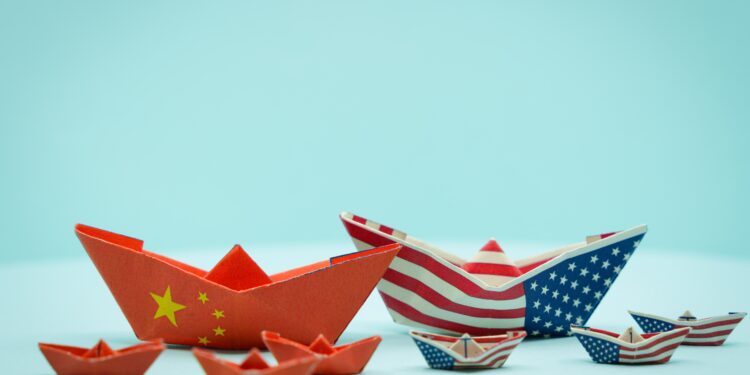“This is the biggest rethink of the international order that we’ve seen, certainly in my lifetime, and probably since at least the ’80s, if not the ’50s,” noted Matteo Maggiori, a professor of finance at Stanford Graduate School of Business.
“Our job is to try to understand it, make sense of it, and figure out if we can get policy to go in the right direction — and hopefully get to better outcomes,” Maggiori said in an interview before he delivered the Dr. Sam-Chung Hsieh Memorial Lecture at Stanford GSB last week.
As the world scrambles to respond to Trump’s tariffs, have we reached a fundamental inflection point? “I have no idea,” Maggiori said. “What I can tell you is that the world I grew up in as a teenager, the 1990s, when you look at the long span of history, that’s the exception rather than the norm.”
Defining Economic Power
Economic power, Maggiori has written, is about coercion: “the ability to induce an entity, be it a foreign government or firm, to take an action that it would otherwise not want to take.” How this coercion is practiced and why it works was the subject of much of Maggiori’s 2025 Hsieh lecture, titled “Geoeconomics and the U.S.-China Great Power Competition.”
“Power is very nonlinear,” he explained. “Where I really have you is when I control almost everything” — resources like a payments system or oil — “and it’s extremely difficult to rearrange production away from it.”
China’s influence is rooted in manufacturing, Maggiori said, while the United States derives its strength from its outsize role in global finance and a still-formidable industrial base. These spheres of influence — and the choke points they create — enable the two powers to bend the world to their will — for now.
“I’ve come to think of these large countries [as] coordination devices,” Maggiori said. By aligning enormous national institutions and private sector action, they can exercise considerable leverage over smaller nations, industries, and businesses.
Coercion and Fragmentation
In his lecture, Maggiori described three fundamental insights into how countries and companies can most effectively play this game of global strategy.
First: Building power is a meaningful policy rationale that may shed light on the current rearrangement of the world economy. If a country aims to build power, for example, it might consider making its resources inexpensive.
“Kill the ability of the rest of the world to produce these things, make them very dependent on you — and then exert power,” Maggiori said. “Think of the dollar payment system: The U.S. doesn’t want [this system] to be expensive. The U.S. wants it to be cheap, because the threat of kicking any one party out is extremely powerful.”
Another insight: When countries marshal their economic might against nations, businesses, or organizations, the targets typically move to protect themselves, disrupting the global economy. “The risk is that we become overly secure at the expense of fragmenting globalization,” Maggiori said. “ Globalization is a little bit like social media: You want to be on this global system because everybody else is on it.… So as we all start to move away, the global system becomes less and less appealing, and we get a fragmentation doom loop.”
Finally, limited coercion is the most effective form of coercion. “If you’re one of these big, powerful countries and you bully the rest of the world all the time, they’re going to react, and they’re going to react by moving away from you, by not wanting to deal with you, because they’re constantly afraid of being bullied,” Maggiori said. “Ultimately, that dissipates your own power.”
Read the full article by Michael McDowell / Stanford Business












